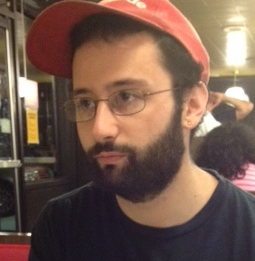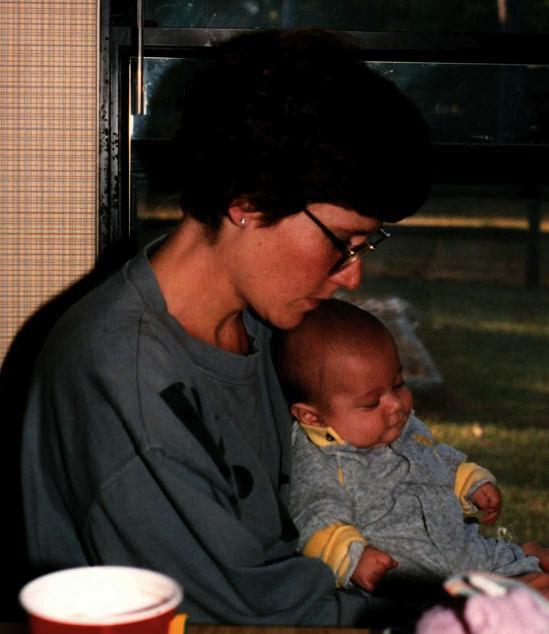| Friendship Is an Openness to Death* |
![PDF-NOTE: Internet Explorer Users, right click the PDF Icon and choose [save target as] if you are experiencing problems with clicking.](http://rsnonline.org/templates/rsntemplate-smallmasthead/images/pdf_button.png) |
 |
Ilya Merlin, University of North Carolina, Charlotte
I read these words in October 2011, in this same venue, weeks after my mother died. Joe shared some of his experience with mourning and loss, and I want to keep that spirit of trust and vulnerability alive. I want to do this because I believe in the polemic purchase of acknowledging humanity. My humanity; our humanity; mortality. As I write today, less than one year has elapsed since I received the phone call. I knew that there could only be one reason why my uncle and grandparents would call at midnight: it happened. Though I can’t say for certain, I believe that the thematic immediacy of my mother’s death was perhaps a more prevalent idea in my youth than it was for Still, I don’t want sympathy — she never did. My mother was intelligent, passionate, and hardworking; organ failure or major surgery never stopped her from working multiple jobs. In a sense beyond good and evil, my mother taught me how to persevere. She loved her children, and she was engaged with a battle against order that I was in no place to stop. Rather, we all tried to help, to listen…
I will say of my circuitous path to the academy that I had a phenomenological appreciation of the “carceral archipelago” years before I knew what postmodernism was. My brief career with professional athleticism also differs drastically from my new vocation: reading, thinking, writing, and teaching. Transitions are difficult, and I have been extremely fortunate in having the sort of human teachers — and colleagues — that Joe Wiinikka-Lydon called for. Because Joe laudably started this conversation with his call for a certain sort of pedagogy, thus demonstrating what it looks like in his article, I want to honor his — our — project by describing several other examples of what this looks like. My justification also comes from the AAR homepage, wherein a banner on the left reads "Connect with scholars." I had been living in Charlotte for just weeks when I got the phone call. I had one friend there; she was a member of my graduate cohort — and my neighbor by chance. She and her husband were there for me the night I got the phone call; they listened and cared. Twelve hours later, a former classmate arrived from her Tibetan-immersion program located a five-hour drive away. She missed her classes in order to cook for me, read with me, and offer me kind ears while I waited for my sister to fly in from Los Angeles. After the funeral, I came home to an inbox full of thoughtful messages from my future professors and from my undergraduate advisors. I never really questioned how they knew; I didn’t tell them. Sometimes, an acknowledgment of not knowing what to say is much better than nothing. When I simply wasn’t feeling up to a seminar discussion on the thematic of “dead mothers returned” in post-Marxist-Frankenstein scholarship two weeks after my mom died, I knew that my friend down in Chapel Hill would help me laugh, and he would listen. I know that my comrade from Virginia will free-style rap with me whenever I need to let it out. I know that my entire thesis committee consists of caring, brilliant scholars who allow me a certain comfort within my own skin, and within my project. Rather than compromise the integrity of scholastic endeavors, I believe that these human interactions foster meaningful work of embodied consequence within the academy and beyond. The concern that I received from my intellectual community kept me together during my moments of vertigo. For this I am very grateful, and I hope to demonstrate a similar style of empathy towards my students, colleagues, and mentors. As Joe said, this isn’t a call for professors to be therapists. Though what is wrong with loaning a struggling student your copy of Camera Lucida, telling them to take a break, and/or listening? It isn’t hard to cry over separation when one is navel-gazing. I love you, Mom. Your son is a scholar now — or something close. |


 Ilya Merlin is currently finishing his MA thesis at the University of North Carolina, Charlotte’s terminal Masters program in religious studies. His thesis focuses on Tupac Shakur’s legacy as read through Julia Kristeva’s notions of poetry’s concurrently revolutionary and religious affectual purchase. In addition to hip-hop scholarship, Merlin’s interests in the intersections of words, ideologies, and bodies has led him to research and present in areas cognate to madness studies and psychoanalysis. He has found his voice in a handful of reviews published in scholarly journals across the humanities, and is excited to share some of his research on Tupacology at this year’s AAR Annual Meeting. In addition, Merlin has given talks and lectures at several venues on topics ranging from hip-hop, art theory, and competitive bodybuilding subculture to Jewish identity. He hopes to find a new home for research at the doctoral level, where he hopes to continue drawing from various fields in pursuing his guiding questions.
Ilya Merlin is currently finishing his MA thesis at the University of North Carolina, Charlotte’s terminal Masters program in religious studies. His thesis focuses on Tupac Shakur’s legacy as read through Julia Kristeva’s notions of poetry’s concurrently revolutionary and religious affectual purchase. In addition to hip-hop scholarship, Merlin’s interests in the intersections of words, ideologies, and bodies has led him to research and present in areas cognate to madness studies and psychoanalysis. He has found his voice in a handful of reviews published in scholarly journals across the humanities, and is excited to share some of his research on Tupacology at this year’s AAR Annual Meeting. In addition, Merlin has given talks and lectures at several venues on topics ranging from hip-hop, art theory, and competitive bodybuilding subculture to Jewish identity. He hopes to find a new home for research at the doctoral level, where he hopes to continue drawing from various fields in pursuing his guiding questions. many of my peers. This probably had to do with the fact that my mother made it very clear to me, ever since I can remember, that death was a near and certain reality for her. My mother suffered from a certain “disorder” — a product of society no doubt; she starved herself to death. There absolutely exists a politics of death and mourning, and my mother’s death was/is especially unintelligible within this order.
many of my peers. This probably had to do with the fact that my mother made it very clear to me, ever since I can remember, that death was a near and certain reality for her. My mother suffered from a certain “disorder” — a product of society no doubt; she starved herself to death. There absolutely exists a politics of death and mourning, and my mother’s death was/is especially unintelligible within this order.